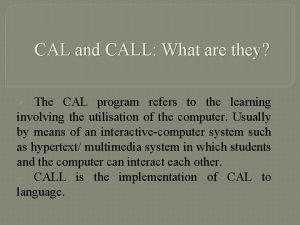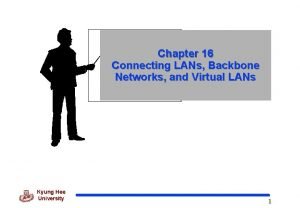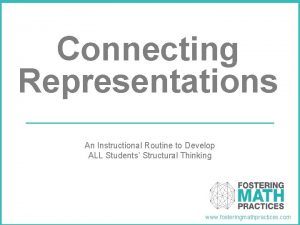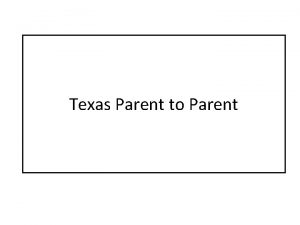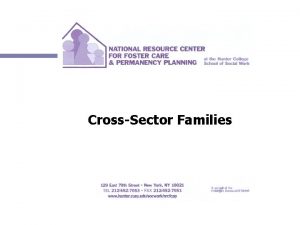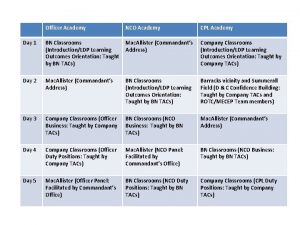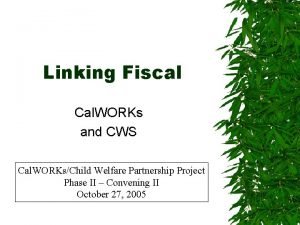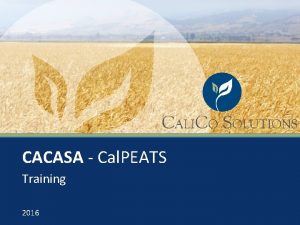Cal State LA Parent Academy Connecting with Families






















![THE SYLLABUS: A ROAD MAP FOR EVERY CLASS Syllabus: noun, plural syllabuses, syllabi [sil-uh-bahy]: THE SYLLABUS: A ROAD MAP FOR EVERY CLASS Syllabus: noun, plural syllabuses, syllabi [sil-uh-bahy]:](https://slidetodoc.com/presentation_image_h2/20680fd982ebff40d6189e150f0c610a/image-23.jpg)
























- Slides: 47

Cal State LA Parent Academy Connecting with Families and Community October 17, 2015 Golden Eagle Ballrooms 8: 30 a. m. – 1: 00 p. m.

HIGH SCHOOL VS. COLLEGE HOW IS COLLEGE DIFFERENT FROM HIGH SCHOOL

HIGH SCHOOL VS. COLLEGE HOW IS COLLEGE DIFFERENT FROM HIGH SCHOOL High School College It is mandatory and usually free It is voluntary and there is a cost tuition. Follow a school-directed schedule and proceed from one class to another. Individual students must manage their own time and schedules. General education classes dictated by State/district requirements. Classes based on field of study; requirements vary, and number of units may vary. Typically a school year is 36 weeks long; some classes extend over both semesters. Summer classes may be offered but are not used to accelerate graduation. Academic year is divided into three quarters. Courses are offered fall, winter, and spring quarters. Summer quarter may be used to accelerate graduation.

HIGH SCHOOL VS. COLLEGE HOW IS COLLEGE DIFFERENT FROM HIGH SCHOOL High School Class attendance is usually mandatory and monitored closely. College Attendance policies may vary with each instructor. Lack of attendance will impact performance. Classes generally have no more than 30 Classes may have 100 or more students. -35 students. Text books are typically provided at little or no expense. Textbooks can be expensive. An anticipated range for a full-time student is ($200 -$400 per quarter). Guidance is provided for students so that they will be aware of graduation requirements. Graduation requirements vary for different fields of study. Student is responsible for monitoring their progress and seeking advice.

HIGH SCHOOL VS. COLLEGE HOW IS COLLEGE DIFFERENT FROM HIGH SCHOOL STUDYING High School Students may study outside of class as little as 1 -2 hours per week, and this may be mostly last-minute test preparation. College Students need to study at least 2 -3 hours outside of class for each hour in class. Students seldom need to read anything Students need to review class notes more than once, and sometimes and text materials regularly. Use time listening in class is enough. between classes carefully. Expected to read short assignments that are discussed and re-taught, in class. Students are assigned substantial amounts of reading and writing which may not be directly addressed in class, but may be covered on tests.

HIGH SCHOOL VS. COLLEGE HOW IS COLLEGE DIFFERENT FROM HIGH SCHOOL TESTING High School College Frequent, covering small amounts of material. Testing is usually infrequent and may be cumulative, covering large amounts of material. A particular course may have only 2 or 3 tests in a quarter. Make-up tests are often available. Make-up tests are seldom an option and may have to be requested. Test dates can be arranged to avoid conflicts with other events. Usually, scheduled tests are without regard to other demands. Frequently conducts review sessions emphasizing important concepts prior to test. Faculty rarely offer review sessions, and when they do, they expect students to come prepared with questions.

HIGH SCHOOL VS. COLLEGE HOW IS COLLEGE DIFFERENT FROM HIGH SCHOOL GRADES High School College Given for most assigned work. May not be provided for all assigned work. Good homework grades may assist in raising overall grade when test grades are low. Tests and papers provide the majority of the grade. Initial test grades, especially when low, may not have adverse effect on grade. Grades on tests and major papers usually provide most of the course grade. Graduation requirements may be met with a grade of D or higher. Requirements may be met only if the student’s average meets the departmental standards.

Table Discussion

WHAT DOES IT TAKE TO SUCCEED IN COLLEGE?

WHAT DOES IT TAKE TO SUCCEED IN COLLEGE If You Know What It Takes to Succeed in College…… You can support your son or daughter to do what it takes to succeed in college. They Have To Do It But you can encourage and support them! And everyone needs support.

WHAT DOES IT TAKE TO SUCCEED IN COLLEGE First the Basics: Your Son or Daughter Need To: • • Know the Graduation Requirements Read the Catalog Take 101, Soon and Seriously See an Advisor Regularly Read and Keep Everything that is Directed to Them Monitor Their Own Progress on GET/CAAR Meet deadlines, Meet Deadlines

WHAT DOES IT TAKE TO SUCCEED IN COLLEGE Prioritize Make school and everything related to school a priority. Not merely important, but a priority! This means School Gets More Time, Energy and Resources than Most Other Things.

WHAT DOES IT TAKE TO SUCCEED IN COLLEGE Don’t Procrastinate! Learn, or Get Better, at Doing Things Now, Rather than Later. Putting Things Off Until Later (Especially on the Quarter System) can: Lead to Missing Deadlines Having Things Pile Up Doing Poor Quality Work Anxiety Feeling Overwhelmed

WHAT DOES IT TAKE TO SUCCEED IN COLLEGE Use Time Wisely, Manage it Effectively and Efficiently

WHAT DOES IT TAKE TO SUCCEED IN COLLEGE Learn How To Study for College Success: 2 -3 Hours of Study for Every Hour in Class Read What is Assigned: Early and More Than Once Learn How to Take Notes Study with Friends Use the Services Provided by the University (Tutoring Center, Writing Center, etc. )

WHAT DOES IT TAKE TO SUCCEED IN COLLEGE University Tutoring Center Tutoring is not just to go from D’s to C’s, but also to Go from B’s to A’s! Offer assitance with: Time Management Workshops Refining Note Taking Developing Study Skills Tutoring for 100’s for Specific Classes Location: Library, Palmer Wing, Room 1039

WHAT DOES IT TAKE TO SUCCEED IN COLLEGE University Writing Center Offers one on one assistance on improving writing skills and developing college level writing skills. Library, Palmer Wing Room 1039 A I will Graduate ege from coll

WHAT DOES IT TAKE TO SUCCEED IN COLLEGE They Must Seek Advisement From Professional Staff and Faculty, not just their friends

WHAT DOES IT TAKE TO SUCCEED IN COLLEGE Faculty can serve as mentors and can also help students: • Learn About Their Professions • With Job Opportunities • Make Connections • With Letters of Reference • Further Explore Educational Oppotunities

WHAT DOES IT TAKE TO SUCCEED IN COLLEGE Develop Relationships and Get Involved Make Friends Study with a Buddy Develop a Support System Join Clubs and Organizations Apply What You Learn in the Classroom, in the Community (Community Engagement)

WHAT DOES IT TAKE TO SUCCEED IN COLLEGE • The Family Should Always Think and Act About Graduating as a FACT • Set a projected Date for Graduation • Have a Plan for Meeting that Date • Remind Them How Quickly 4 or 5 Years Goes By • Stay Motivated • Remind them That There are Always Small Bumps in the Road • That You Support Them • How Proud You are of Them

THE SYLLABUS: A ROAD MAP FOR EVERY CLASS
![THE SYLLABUS A ROAD MAP FOR EVERY CLASS Syllabus noun plural syllabuses syllabi siluhbahy THE SYLLABUS: A ROAD MAP FOR EVERY CLASS Syllabus: noun, plural syllabuses, syllabi [sil-uh-bahy]:](https://slidetodoc.com/presentation_image_h2/20680fd982ebff40d6189e150f0c610a/image-23.jpg)
THE SYLLABUS: A ROAD MAP FOR EVERY CLASS Syllabus: noun, plural syllabuses, syllabi [sil-uh-bahy]: An outline or other brief statement of the main points of a discourse, the subjects of a course of lectures, the contents of a curriculum, etc.

THE SYLLABUS: A ROAD MAP FOR EVERY CLASS Each instructor must provide information at the first class session about the general requirements and goals of the class, and the general criteria that will be used to evaluate the student. An instructor must provide his or her syllabus in an accessible format in keeping with the CSU Accessible Technology Initiative with proper notification from the Office of Students with Disabilities.

THE SYLLABUS: A ROAD MAP FOR EVERY CLASS The syllabus shall include but not limited to the following (Taken and modified from Senate Policy) • Contact Information for the instructor: campus office hours and location, campus telephone extension, and campus e-mail address. • General course description including course prerequisites*, if any. *Prerequisite: Required before the course, like a class, or passing a test. Co-prerequisite: Required to be taken along with. • Student learning outcomes* for the course What it is that students are specifically expected to learn from the class.

THE SYLLABUS: A ROAD MAP FOR EVERY CLASS The syllabus shall include but not limited to the following (Continued) • For all general education courses, the area of the general education program that the course fulfills. • Topical outline of the course, including what will be covered when, and what readings students should have done and when.

THE SYLLABUS: A ROAD MAP FOR EVERY CLASS The syllabus shall include but not limited to the following (Continued) REQUIREMENTS Policies and Procedures, for Example: Attendance Assignments Readings

THE SYLLABUS: A ROAD MAP FOR EVERY CLASS The syllabus shall include but not limited to the following (Continued) REQUIREMENTS (continued) The Basis for Evaluation, for Example Written work, examinations* or quizzes*, term papers*, portfolios*, projects*, laboratory or field work assignments*, and other items as appropriate.

THE SYLLABUS: A ROAD MAP FOR EVERY CLASS The syllabus shall include but not limited to the following (Continued) � Grading system and its relation to achievement of the requirements stated above. � Date and time of final examination. � The following ADA statement verbatim: “Reasonable accommodation will be provided to any student who is registered with the Office of Students with Disabilities and requests needed accommodation. ”* � An academic honesty statement that includes reference to the University Policy. *

THE SYLLABUS: A ROAD MAP FOR EVERY CLASS The syllabus must be made available to students either electronically or in a hardcopy no later than the second meeting of the class.

THE SYLLABUS: A ROAD MAP FOR EVERY CLASS The syllabus: A road map for Every Class Why is the syllabus a road map for every class? Because it provides direction, guidance and vital information about what needs to be done in every single class in order to reach the final destination of the class Successfully.

How to Find Out How Your Child is Doing in College

How to Find Out How Your Child is Doing in College Maintaining open and effective communication with your child about everything, including school, is the best way to find out how your child is doing in college.

How to Find Out How Your Child is Doing in College Open and effective communication is the best way to find out how your child is doing in college • Because it is the best way And • Because the law prohibits you getting information, such as grades, from the University unless it has written consent from your son or daughter.

How to Find Out How Your Child is Doing in College The Family Education Rights and Privacy Act of 1974 (commonly referred to as FERPA), is a federal law that protects the privacy of student education records. Students have specific, protected rights regarding the release of such records and FERPA requires that institutions adhere strictly to these guidelines.

How to Find Out How Your Child is Doing in College In general, a student’s prior written consent is required before institutions can legitimately disclose, even to parents, information that includes the following: • Social Security numbers • Student identification number • Race, ethnicity, and/or nationality • Gender • Transcripts • Grade reports

How to Find Out How Your Child is Doing in College So, once again… Open and effective communication is the best way to find out how your child is doing in college • Because it is the best way And • Because the law prohibits you getting information, such as grades, from the University unless it has written consent from your son or daughter

How to Find Out How Your Child is Doing in College It is important to remember that your child is going through a period in their life (adolescence: 12 to 20 or so years old) that is often characterized by significant physical, emotional, and psychological shifts that can at times be dramatic and result in dramatic changes in behavior

How to Find Out How Your Child is Doing in College Sometimes dramatic changes in behavior (cont. ) • During this time they may be more interested in their friends rather than their family, particularly their parents. • It is a time when children typically act more negative and have more conflicts with their parents. • It is a time when they are trying to exert their independence and challenge authority, which is often represented by you, their parents.

How to Find Out How Your Child is Doing in College Sometimes dramatic changes in behavior (cont. ) • They may want to spend more time alone and with their friends and less time with their families. • They and their friends become the center of the world. • Adolescence is a period during which they may develop, or at least express ideas that may be different from yours.

How to Find Out How Your Child is Doing in College Adolescence… This major change in their life can be challenging, for them, and for you, under any circumstances, but added to it is the major transition of going from high school to college. In college they will have… • More choices they can make on their own • A belief that they have more free time • More independence • Little or no monitoring compared to high school • The potential of less parental involvement

How to Find Out How Your Child is Doing in College Work on Maintaining Effective Communication • Be aware and sensitive to the fact that your child is going through major social and physical changes • Use conversation as an opportunity to express and keep up with their activities and relationships • Stay interested in all aspects of how they’re doing in school!

How to Find Out How Your Child is Doing in College Specific to School: Work on Maintaining Effective Communication Talk and ask, in a way that is consistent with how you interact with your child • How are they adjusting to the new environment, the campus? • Are they making “connections” with other students? • What’s it like in their classroom? --What’s the professor like, how does the professor conduct the class, is there a lot of reading/papers, are they required to participate in class?

How to Find Out How Your Child is Doing in College Specific to School: Work on Maintaining Effective Communication (cont. ) • How will they be graded? --Quizzes, mid-terms and finals, attendance, participation • Are you taking advantage of services on campus to help you perform at your best? • When will they get grades? What do they mean?

How to Find Out How Your Child is Doing in College Specific to School: Work on Maintaining Effective Communication (cont. ) • Tell them how proud of them you are that they are in college • Tell them that you know that they are making sacrifices by going to college, but what a difference being a college graduate will make in the rest of their lives • Tell them you know they will make it, and you will always support them

Table Discussion

THANK YOU!
 Connecting families bath
Connecting families bath Connecting families bath
Connecting families bath Cal and cal
Cal and cal Big families vs small families
Big families vs small families Cal coast academy
Cal coast academy Largest cal state campus
Largest cal state campus Csudh financial aid disbursement dates
Csudh financial aid disbursement dates Cal state la
Cal state la Cal state la arts and letters advising
Cal state la arts and letters advising Cal state dominguez hills colors
Cal state dominguez hills colors Cal state northridge psychology
Cal state northridge psychology Eep cal state la
Eep cal state la Risk management disney
Risk management disney Cal state la cls program
Cal state la cls program Cal state la charter college of education
Cal state la charter college of education Child ego state
Child ego state Success academy georgia state
Success academy georgia state Kherson
Kherson Purpose of a connecting rod
Purpose of a connecting rod Types of speciation
Types of speciation Fork and blade connecting rods
Fork and blade connecting rods What is an isoline
What is an isoline Introduction hook background thesis statement
Introduction hook background thesis statement Connecting the concepts angiosperm reproductive structures
Connecting the concepts angiosperm reproductive structures What is the connecting stalk
What is the connecting stalk Connecting rod material
Connecting rod material Creativity is just connecting things
Creativity is just connecting things Cause and effect adverbs
Cause and effect adverbs Connecting the concepts sexual reproduction
Connecting the concepts sexual reproduction Connecting the concepts aquatic biomes
Connecting the concepts aquatic biomes Difference between bus backbone and star backbone
Difference between bus backbone and star backbone Campbell biology concept check answers
Campbell biology concept check answers Connecting the concepts evolution
Connecting the concepts evolution Human domain and kingdom
Human domain and kingdom Section 17-4 patterns of evolution answer key
Section 17-4 patterns of evolution answer key Transversal connecting angles
Transversal connecting angles Connecting a verbal description to table and graph
Connecting a verbal description to table and graph A repeater is a connecting device that operates in the
A repeater is a connecting device that operates in the Small bags with tubes connecting them
Small bags with tubes connecting them Pistons rings and connecting rods
Pistons rings and connecting rods Connecting hemispheres world history
Connecting hemispheres world history Pythagorean theorem of a rectangular prism
Pythagorean theorem of a rectangular prism Copyright
Copyright A repeater is a connecting device that operates in the
A repeater is a connecting device that operates in the Hierarchy of organization in a snowy owl
Hierarchy of organization in a snowy owl Acti connecting vision
Acti connecting vision 8 themes of social studies
8 themes of social studies Connecting representations
Connecting representations


